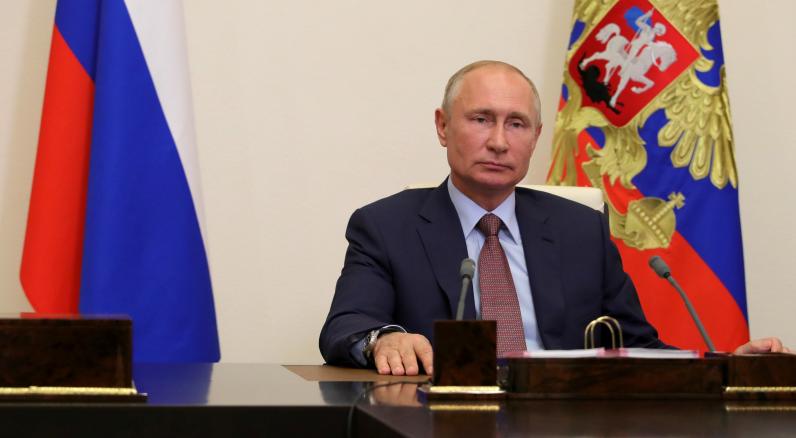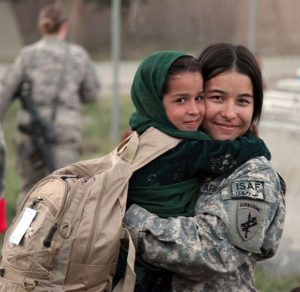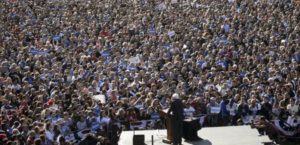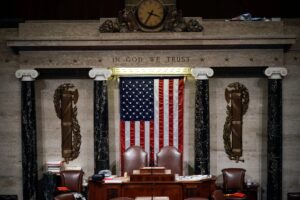
Putin has been labelled a mad man many times. Inews recently called him “an unpredictable man with a noticeable willingness to do anything crazy.” MSNBC’s host, Amyn Mohyledin, claimed that Putin is “not capable of the calculations required to run a country.” However, there is a method to the madness. Putin is not an insane man who stumbled his way to the forefront of a country, but rather a cold and calculating political agent whose “madness” makes sense when you understand his political context.
Putin was born in 1952 in Leningrad (now Saint Petersburg) and grew up in the Krushchev era of de-Stalinization. By this point in time, the general populace had already seen the horrors of Lenin, then Stalin, and the Union of Soviet Socialist Republics (USSR) began to deregulate. Putin was born at the right time to feel the impact on Russian society of both the old Tsarist regime and the foundations of the USSR.
Vladimir Putin’s family had many connections to the Russian Communist Party. His grandfather was the Secretary General’s personal cook, his brothers died serving in the army, and many family members were employed by the federal bureaucracy. With their position, Putin was able to get a good education. He ended up studying law and economics at Zhdanov (now Saint Petersburg State) University. After his Master’s Degree, he spent many years in the KGB (the USSR’s intelligence agency) primarily spying on the East German state/people and gathering new recruits.
Despite being part of the Communist country’s state apparatus, when the 1991 coup came, Putin instantly threw his support behind the Democrats and resigned.
Putin then joined the world of modern Russian politics. He joined “Our Home” – a moderate capitalist party that advocated for civic nationalism. Putin went through local Moscow politics before he was launched into the spotlight by President Boris Yeltsin,the leader of the coup that ended the Soviet Union. Yeltsin was a hero to those with Communism fresh in their minds. As the officially chosen successor of Yeltsin, Putin benefitted from his appeal. However, he won the Presidential election by only three percent.
Putin was in trouble. The economy had not grown as much as desired during the transition to a market economy. Soviet-era nostalgia was on the rise. Many turned to extreme ideologies, be it ultra-nationalism or communism. People were angry at the status quo. So, Putin joined them. Having experienced both nationalism and communism, Putin did the unthinkable. He fused the ideological extremes.
Leading the formation of a new party, United Russia, Putin combined growing nostalgia for Soviet Communism with a new sense of Russian nationalism. He demonstrated his anger at the status quo by changing it, combining the welfare and stability people enjoyed under the USSR with the sense of community and self-interest that nationalism provides. The country’s interest was no longer spreading Communism, but the interest of the Russian people, or so Putin would have you believe. It was the perfect packaging for a new regime. Putin accessed the emotionality of the masses and weaponised it.
Putin’s promises of this fusionist ideology were not empty either. His party restored Soviet-era projects on state healthcare, education, and agriculture. He executed widespread police and army reform to focus on domestic stability rather than defence. He used Russian oil as a tool to leverage international concessions and power. His policy resulted in steady growth. Since the beginning of his Presidency, Russia has nearly doubled its GDP (when adjusted to purchasing power), life satisfaction has risen significantly, and was barely affected by the 2008 global recession. Putin not only delivered stability but also growth.
To commandeer this stability and growth financially, Putin used the nostalgia for the USSR and Russian Empires as the fuel for territorial expansion. This not only appeased both the nationalist and socialist factions but also furthered the image of Russian restoration of power. He annexed Chechnya in the 2nd Chechnyan war, and parts of the Caucuses in the Russo-Georgian wars. Later he would also annex Crimea from Ukraine and support the secession of Transnistria.
What percentage of Russians support these acts of aggression? Well, it varies depending on the conflict but support for each of these actions hovers around 80%. Putin won his last (mostly) considered “democratic” election (after campaigning on his economic growth and military conquests) with a staggering 71 percent.
This is Putin’s genius. By using the state apparatus to provide stability (economic and political) and steady growth, he secures the part of the population that remembers only chaos: those who remember the Cold War and post-Soviet era of death, coups, secession, and general chaos. His ideology and foreign policy secures him the support of both main factions of elites and much of the population.
When you view the invasion of Ukraine through this lense (including Putin’s background, the elites that back his regime, and his dominant ideology) a newfound method to the madness is revealed. In fact, Ukraine is another smart step on Putin’s continued stranglehold on Russian politics.
Since 2019 Putin has been increasingly unpopular. With a new generation who no longer remembers the chaotic years pre-1995, and COVID running rampant, President Putin’s stability message has lost some of its lustre (although it continues to be influential among the senior population). Recent large-scale protests over Putin’s policies have also put the stability argument into question.What has stayed consistent is the two faction nature of Russian politics. Socialist nostalgics have lost much of their power but the nationalist faction has gained power with growing youth membership. This is shown by growing membership in (what is bound to be the new biggest opposition party according to voting trends) the Liberal Democratic Party. This party is even more nationalist and interventionist than Putin’s.
Given the ideology of Putin’s greatest rivals, the invasion of Ukraine is a rallying cry for political support. This war is just as much about politics as national security. Putin’s personal support base needed to be reinvigorated.
Just as Putin has tapped into anger at the status quo before, he did it again. This time he aimed Russian anger in the direction of Ukraine. COVID-19, economic stagnation, and a lust for change made for a global emotional outburst. If Putin did not redirect this response toward Ukraine, it would have inevitably begun his downfall. The war in Ukraine accomplishes all of Putin’s primary political goals: a national cause to rally the electorate behind, delivering results for nationalists and Soviet nostalgiacs, and the temporary regaining of oligarchic support in a time of crisis. Putin is a political mastermind and the media’s labelling of him as incompetent is simply wrong.



